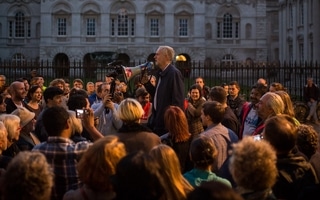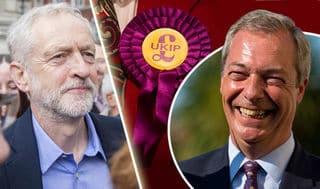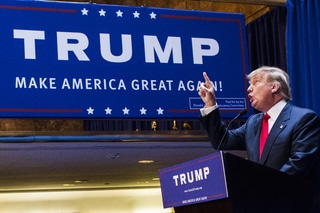
In his final, catastrophic budget George Osborne announced cuts to disability benefits. These were to pay for more tax cuts for the better off, specifically raising the "middle" range 40% income tax rate threshold from those earning £42,000/year to £50k. A nice, tidy bonus for the better off bedrock of the Tories, but also yet another tax cut for the top rate payers without it immediately looking like one. Readers may recall that raising the basic rate was Osborne's favoured way of cutting taxes for the better off while pretending to care about putting more cash into pockets of modest depth. The unexpected intervention by Iain Duncan Smith put paid to the disability cuts, but the £4bn tax cut commitment remained. Albeit without a means of plugging the hole in the budget.
A few things have happened since then. Theresa May's commitment to rescue the Thatcherite legacy from Dave and Osborne's ineptitude has, at the level of rhetoric at least, involved a sharp turn away from the last six years. And as snoring, boring Philip Hammond undertakes his Autumn statement this coming Wednesday, we'll finally see what this means. A lurch to Keynes-lite, or, if you prefer, reheated Butskellism is on the cards, particularly the reassertion of the state's authority in matters economic. And in this spirit, unfunded promises - like the tax bung - are probably for the chop too.
How is it that John McDonnell has committed Labour to this policy, especially when the party has promised to reverse tax cuts for the rich? First, there is an element of policy continuity. Ed Miliband was fond of talking about the squeezed middle. In this season's wonky fashions, this strata is restyled the 'Just About Managing' (or, horrendously, 'the JAMs'), a category covering almost everybody, whether one is just about putting enough food on the table or has struggled to scrape together funds enough for a weekend in Paris/new tablet/second house. Its assumptions tap into the conceit of what you might call the 'aspirational' middling layers, those who believe themselves uniquely industrious and hard pressed by the idling hordes. Just About Managing decouples want from poverty, airbrushes out relative privilege, and positions them as the deserving deserving.
It's also the strata Labour needs to win over to take the next general election. With critics decrying Jeremy Corbyn and John McDonnell for pursuing a core vote strategy (and also attacking them for neglecting workers, which in their imagination are just queuing up to support UKIP), here we have a policy bang outside the comfort zone. You know, the territory Labour needs to stake out, according to a former Prime Minister threatening a return to politics. I suspect John's calculation that keeping this tax cut, especially if the Tories abandon it, will help us in the Tory shires and the swing seats. After all, if stuffing the doctors' mouths with gold ensured Aneurin Bevan set up the NHS, can doing something similar pave a path to power through the marginals?
In conventional times, it wouldn't be enough. The odds remain stacked against Jeremy and John, not least because of past associations and the trashing of their reputations over the last year. Yet these are far from normal times. And, agree with the new policy or not, Labour has to find a way of connecting with enough of the Tory-leaning well-off. Income tax cuts are one route. If not this, then what?







